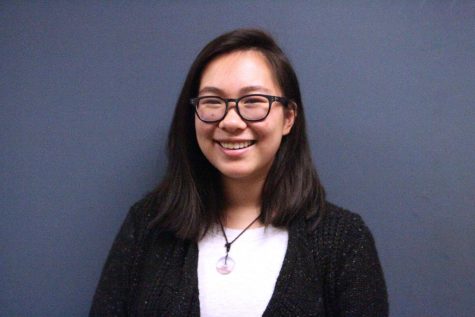Behind the “Model Minority” myth: How do I, an Asian American student, tackle mental health?
October 5, 2018
A thought runs through my mind: “Be grateful you’re not going to school in Singapore.” My hands scramble to finish the worksheet, a familiar feeling of shame rising in my chest. My chest feels tight. I peek through Instagram stories: some of my friends in Singapore post about studying until 5 a.m. daily. I look at my clock: 4 a.m. The shame of inadequacy rises in my chest, it grips my lungs; my chest feels tight. I decide to go back to work and hopefully, with enough effort, I’ll be fine. I don’t tell anyone. I can’t tell anyone.
I started my freshman year like many other students: sleepy, but bright-eyed and hopeful of all that high school promised. I was optimistic about Lynbrook; there was so much more freedom that Miller Middle School did not offer. And while I did have much more freedom in terms of classes, clubs and extracurriculars, as the year progressed, I began to feel a lot more restricted.
I had one main goal my freshman year: impress my parents and relatives with my academics. Outside of my own ambition, I had always felt this pressure to perform well in school. It wasn’t about personal success, but rather the idea that I must perform well to get accepted into Stanford, to pursue my childhood dream of becoming a trauma surgeon and to make my family proud. I started going to sleep later and later to finish my work with the idea that more time spent on the assignment meant I produced better quality work.
Midnight turned into 1 a.m., which turned into 2 a.m., which then spiraled into 4 or 5 a.m., and sometimes even 6 a.m. My work was never good enough for myself. I doubted my skills. I doubted that any amount of work I put in would be good enough. So I worked harder.
The stress weighed on me into my sophomore year. Failure never felt like an option, and if working until 6 a.m. could prevent me from failing, from not finishing my homework, from doing poorly on tests, I was willing to pay the price. Lynbrook culture played a role too. While I doubted that being up so late would benefit my academics, peers praised me for studying so hard. I equated my lack of sleep with hard work. I isolated myself, sitting alone at brunch and lunch to finish work to hopefully lessen the workload I had at home. Inadequacy was a familiar feeling, and I accepted nothing less than perfect from myself; I didn’t accept anything short of good grades, a 1600 SAT score in my junior year and as many extracurricular activities I could handle. My worth was attached to my academic performance, to the number of extracurriculars I did, to how late I stayed up. Nothing could satisfy my need for perfection.
I have always felt like I have to live up to the ”model minority” myth, the idea that all Asian -Americans are naturally high achievers, obedient, and never in need of help. For a lot of my high school life, asking for help seemed like a display of weakness. So when I eventually tried to reach out, I kept it hidden. I looked for therapists, but never told my parents I wanted one. I told my friends I was struggling, but refrained from elaborating on the topic for fear that I would be judged. I wanted to let teachers know I needed to open up to someone about my mental health, but I feared being thought of as less of a student.
For those I told, some responses went along the lines of “Well, at least you don’t go to school in Singapore, you should be grateful that you go to school in America!” My struggles were “never enough” because I was American, but my achievements were “never enough” because I was Asian. I was ashamed of struggling with my mental health, of not living up to the stereotypical expectations that I would land a STEM career after graduating, of even wanting help managing my mental health. But I couldn’t tell anyone that. As an Asian-American, I was expected to never need help.
At times, I felt like mental health resources just weren’t for me. Nothing I read online, nothing I read in pamphlets, nothing I read in books addressed the cultural source of my shame. Nobody told me the “model minority” myth was, in fact, a complete myth. Nobody told me wanting to major in a subject outside of STEM was okay. Nobody told me that my pain was real, even if I doubted that it was. If anything, I felt invalidated by online sources and mental health resources. Everything told me to sleep more, to make more time for friends and family, to reach out. But how could I sleep more and make time for socializing when the crushing pressure to live up to the model minority myth drove me to stay up? How could I sleep moroe when not sleeping was a sign of hard work in my community? How could I reach out when I was of a demographic stereotyped to not need help?
I wish there were more readily available resources and someone to tell me that I didn’t have to live up to the stereotypes of Asian-Americans, and I wish people I talked to understood how to approach the impact my culture has on the perception of my mental health. I struggled, and I still do, but I want people to understand that it was more than just a struggle between myself and my work. It was a force of the societal expectations placed on Asian-Americans. It was a force of never feeling like I was enough because my struggles weren’t as bad and my effort was never as great as someone in Asia. It was a force of never feeling like my struggles were validated. My mental health was never just my work versus me, it was so much more. But no one realized that.
I’m not here to say that all Asian-Americans have terrible perceptions of mental health; there’s no way I can make that kind of generalization. I’m here to say that when we create mental health resources for different communities, we need to acknowledge that different cultural backgrounds impact mental health as well. There’s no catch-all solution for addressing mental health, and that’s something that parents, students, and educators must realize.
As a predominantly Asian community, we must break down the stigma behind discussing mental health. Spark discussions with those around you; normalize the idea of talking about your struggles. Realize that mental health is more than just a lack of sleep or too much homework; culture plays a role too. Be supportive of your peers; learn to acknowledge, not invalidate and support your friends in times of need.




































































Selina • Oct 31, 2018 at 12:21 am
thanks for sharing this nicole <3 you're so well-spoken, and i can definitely appreciate that you stated some pretty tough truths. i'm sure lots of people can resonate with your experiences 🙂